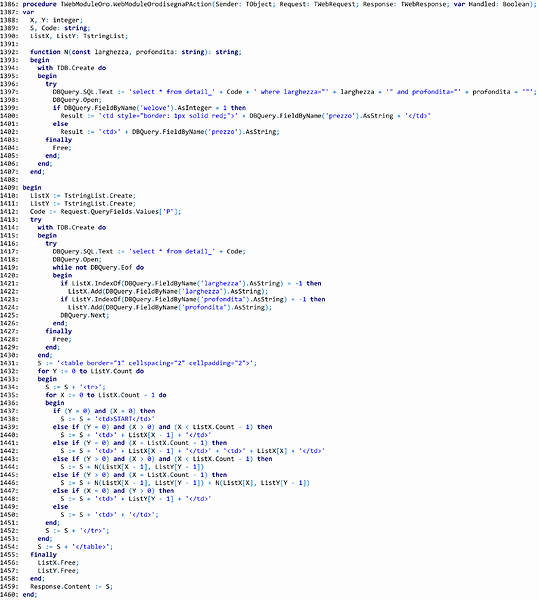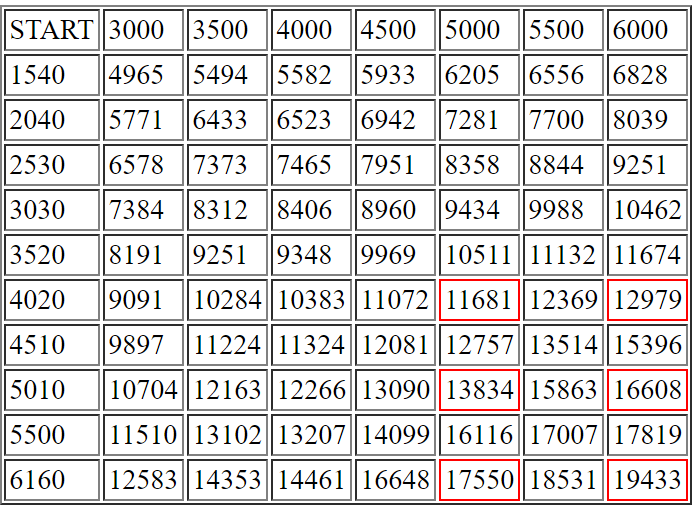hello, I’m newbie about Erlang/Elixir, I found them very cool. I want learn this fantastic toolchain.
I’m a old school coder, I’m using .NET MVC and mainly Delphi (Pascal) for custom web programming.
I have a question, see the below data, I like move to Elixir/Rust/Nif toolchain, however Delphi is fantastic, but about Elixir functional capabilities: how to render a custom table from a sql database, see this code in Delphi/Webbroker:
In the above code I use the HTTP methods routed by webbroker, then with a pair of nested queries I build the html table resulting as the attached image.
The DDL is very basic, just to have a sample.
CREATE TABLE detail_a101addm (
id int NOT NULL AUTO_INCREMENT,
larghezza int DEFAULT NULL,
profondita int DEFAULT NULL,
prezzo float DEFAULT NULL,
welove int DEFAULT ‘0’,
descrizione varchar(2048) CHARACTER SET utf8 COLLATE utf8_unicode_ci DEFAULT NULL,
PRIMARY KEY (id)
) ENGINE=InnoDB AUTO_INCREMENT=73 DEFAULT CHARSET=utf8 COLLATE=utf8_unicode_ci
| 3 | 3000 | 1540 | 4965 | 0 | 8 |
|---|---|---|---|---|---|
| 4 | 3000 | 2040 | 5771 | 0 | 8 |
| 5 | 3000 | 2530 | 6578 | 0 | 8 |
| 6 | 3000 | 3030 | 7384 | 0 | 8 |
| 7 | 3000 | 3520 | 8191 | 0 | 8 |
| 8 | 3000 | 4020 | 9091 | 0 | 8 |
| 9 | 3000 | 4510 | 9897 | 0 | 8 |
| 10 | 3000 | 5010 | 10704 | 0 | 8 |
| 11 | 3000 | 5500 | 11510 | 0 | 8 |
| 12 | 3000 | 6160 | 12583 | 0 | 8 |
| 13 | 3500 | 1540 | 5494 | 0 | 8 |
| 14 | 3500 | 2040 | 6433 | 0 | 8 |
| 15 | 3500 | 2530 | 7373 | 0 | 8 |
| 16 | 3500 | 3030 | 8312 | 0 | 8 |
| 17 | 3500 | 3520 | 9251 | 0 | 8 |
| 18 | 3500 | 4020 | 10284 | 0 | 8 |
| 19 | 3500 | 4510 | 11224 | 0 | 8 |
| 20 | 3500 | 5010 | 12163 | 0 | 8 |
| 21 | 3500 | 5500 | 13102 | 0 | 8 |
| 22 | 3500 | 6160 | 14353 | 0 | 8 |
| 23 | 4000 | 1540 | 5582 | 0 | 8 |
| 24 | 4000 | 2040 | 6523 | 0 | 8 |
| 25 | 4000 | 2530 | 7465 | 0 | 8 |
| 26 | 4000 | 3030 | 8406 | 0 | 8 |
| 27 | 4000 | 3520 | 9348 | 0 | 8 |
| 28 | 4000 | 4020 | 10383 | 0 | 8 |
| 29 | 4000 | 4510 | 11324 | 0 | 8 |
| 30 | 4000 | 5010 | 12266 | 0 | 8 |
| 31 | 4000 | 5500 | 13207 | 0 | 8 |
| 32 | 4000 | 6160 | 14461 | 0 | 8 |
| 33 | 4500 | 1540 | 5933 | 0 | 8 |
| 34 | 4500 | 2040 | 6942 | 0 | 8 |
| 35 | 4500 | 2530 | 7951 | 0 | 8 |
| 36 | 4500 | 3030 | 8960 | 0 | 8 |
| 37 | 4500 | 3520 | 9969 | 0 | 8 |
| 38 | 4500 | 4020 | 11072 | 0 | 8 |
| 39 | 4500 | 4510 | 12081 | 0 | 8 |
| 40 | 4500 | 5010 | 13090 | 0 | 8 |
| 41 | 4500 | 5500 | 14099 | 0 | 8 |
| 42 | 4500 | 6160 | 16648 | 0 | 9 |
| 43 | 5000 | 1540 | 6205 | 0 | 8 |
| 44 | 5000 | 2040 | 7281 | 0 | 8 |
| 45 | 5000 | 2530 | 8358 | 0 | 8 |
| 46 | 5000 | 3030 | 9434 | 0 | 8 |
| 47 | 5000 | 3520 | 10511 | 0 | 8 |
| 48 | 5000 | 4020 | 11681 | 1 | 8 |
| 49 | 5000 | 4510 | 12757 | 0 | 8 |
| 50 | 5000 | 5010 | 13834 | 1 | 8 |
| 51 | 5000 | 5500 | 16116 | 0 | 9 |
| 52 | 5000 | 6160 | 17550 | 1 | 9 |
| 53 | 5500 | 1540 | 6556 | 0 | 8 |
| 54 | 5500 | 2040 | 7700 | 0 | 8 |
| 55 | 5500 | 2530 | 8844 | 0 | 8 |
| 56 | 5500 | 3030 | 9988 | 0 | 8 |
| 57 | 5500 | 3520 | 11132 | 0 | 8 |
| 58 | 5500 | 4020 | 12369 | 0 | 8 |
| 59 | 5500 | 4510 | 13514 | 0 | 8 |
| 60 | 5500 | 5010 | 15863 | 0 | 9 |
| 61 | 5500 | 5500 | 17007 | 0 | 9 |
| 62 | 5500 | 6160 | 18531 | 0 | 9 |
| 63 | 6000 | 1540 | 6828 | 0 | 8 |
| 64 | 6000 | 2040 | 8039 | 0 | 8 |
| 65 | 6000 | 2530 | 9251 | 0 | 8 |
| 66 | 6000 | 3030 | 10462 | 0 | 8 |
| 67 | 6000 | 3520 | 11674 | 0 | 8 |
| 68 | 6000 | 4020 | 12979 | 1 | 8 |
| 69 | 6000 | 4510 | 15396 | 0 | 9 |
| 70 | 6000 | 5010 | 16608 | 1 | 9 |
| 71 | 6000 | 5500 | 17819 | 0 | 9 |
| 72 | 6000 | 6160 | 19433 | 1 | 9 |
So:
- how to access low level SQL dataset
- how to iterate SQL dataset (we don’t have loops in Elixir)
- how to render/pre-compile a html view (or direct PLUG IO stream) with custom HTML inserts
- how to solve the above task with Elixir/Phoenix?
Thank you,
kind regards,
Roberto Della Pasqua



 But there are much more Phoenix resources out there – including
But there are much more Phoenix resources out there – including 






















